Female youth voices from Bangladesh at COP29

The voices of young women from Bangladesh resonated powerfully at the 2024 United Nations Climate Change Conference (COP29), bringing stories of resilience, advocacy, and determination to the global stage. Representing diverse communities and experiences, Saila Sobnom Richi, Farzana Farak Jhumu, and Fariha Aumi embodied the spirit of youth leadership in addressing climate justice.
Saila Sobnom Richi, ICCCAD Delegate
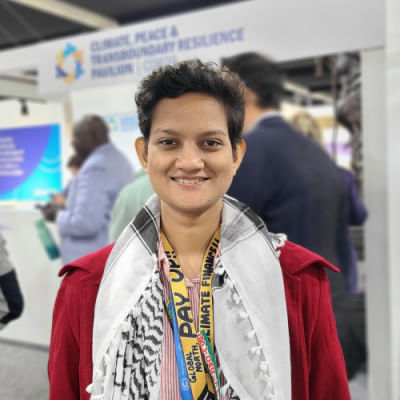
Saila Sobnom Richi, an undergraduate student from the Institute of Disaster Management and Vulnerability Studies at Dhaka University, began her journey in climate activism with a deep connection to her community in Barishal where she was born and brought up. Her path to climate leadership started with YouthNet for Climate Justice, where she became a Youth Climate Ambassador and Media and Movement Coordinator, advocating for gender and climate justice for over four years. Reflecting on her work, Saila shared, "I have seen how vulnerable our people are to climate change. If we don't act now, our future is at stake."
At COP29, Saila brought stories of vulnerable Bangladeshi communities to the global stage, highlighting the urgent need for climate finance and addressing the realities faced by people displaced internally due to climate impacts.
Speaking at the "Youth Gathering" event hosted by the Government of Bangladesh, Saila posed a critical question: "Are youth voices genuinely being empowered, or are they merely tokenised?" Her words resonated with many young attendees grappling with similar doubts.
Representing Bangladesh at COP29 came with its own challenges. Saila candidly reflected on her reliance on a foreign international non-governmental organisation (INGO) badge and funding from another country's embassy to attend, questioning the authenticity of national support for youth empowerment. Despite the hurdles, Saila remained undeterred, participating in movements such as demanding climate finance at the COP29 Action Zone. She also launched her documentary, INFLUENCERS - The Path Led by Knowledge, at the Share Hub Pavilion, showcasing the power of youth-led initiatives.
Saila expressed her frustration at the insufficient allocation of USD three hundred billion instead of the required USD one trillion for climate finance. Yet, she maintained her optimism, emphasising the need for the youth to be included in decision-making processes and not just as symbolic representatives. Reflecting on her first COP experience, Saila said, "This is just the beginning for me. I will continue fighting for my country to have a stronger voice on the global stage."
Farzana Faruk Jhumu, UNICEF Youth Advocate
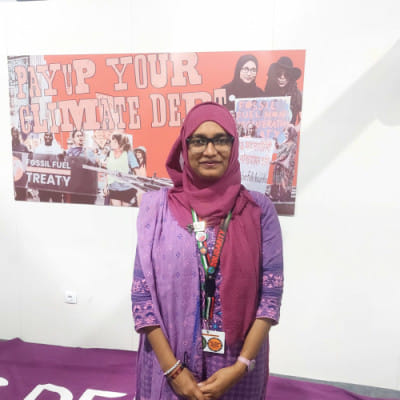
Farzana Faruk Jhumu's journey in climate activism began in 2018 when she co-founded KaathPencil, an organisation focused on educating underprivileged children. Through her interactions with climate-displaced families, Farzana realised the profound human impact of environmental disasters.
"I remember speaking to a mother who had lost her home to river erosion. Her pain became my purpose," Farzana recalled. This experience inspired her to go deeper into the intersection between climate change, child rights, and justice, eventually joining the global "Fridays for Future" movement – an international movement of school students who skip Friday classes to participate in demonstrations to demand action from political leaders to prevent climate change.
At COP29, Farzana was moved by several powerful moments. She spoke at an event advocating for the International Court of Justice (ICJ) to address climate change and human rights. Reflecting on the experience, she said, "It was empowering to demand accountability from states for the harm they have caused to vulnerable communities." Listening to youth stories from around the globe reinforced her belief in the collective power of young people to challenge states on their climate obligations.
One of her most significant achievements at COP29 was giving an intervention in a negotiation room, representing women, gender constituencies, and youth non-governmental organisations (NGOs). Her demands, delivered with conviction, were reflected in the COP29 presidency text.
"That moment showed me that our voices can truly shape decisions, even in spaces dominated by power and politics," Farzana said.
Despite her successes, Farzana faced challenges as a young woman navigating a patriarchal system. She described moments of "mansplaining" and being tokenised on panels to ensure gender balance. However, these experiences only strengthened her resolve. "Being underestimated only fuels my determination to prove them wrong," she remarked.
Farzana also found inspiration in her interactions with global leaders and fellow activists. Representing the youth in a meeting with Dr Muhammad Yunus, she proposed creating an official youth mechanism to enhance their involvement in multilateral processes. Reflecting on her overall COP29 experience, Farzana said, "Sea levels are rising, but so are we. We have no choice but to fight harder for our future."
Fariha Aumi, ICCCAD Delegate
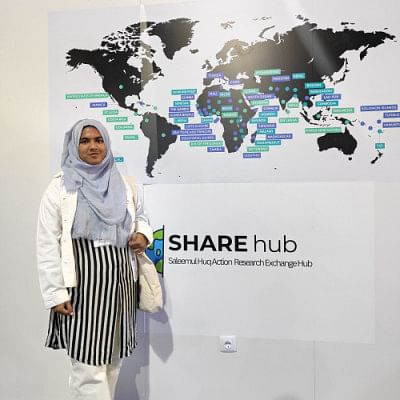
Fariha Aumi's activism was inspired by her upbringing in southern Bangladesh, where she witnessed firsthand the impacts of climate change. Her passion deepened in 2018 when Greta Thunberg's "Fridays for Future" movement ignited global awareness, prompting her to join the fight for climate justice.
"Growing up, I saw how cyclones devastated my community. It's not just statistics for us; it's our lives," Fariha shared.
At COP29, Fariha participated in a panel discussion with the International Centre for Climate Change and Development (ICCCAD) (ICCCAD) that brought together youth from Bangladesh, China, and Nepal. This exchange of regional perspectives was a highlight for her, as it built deeper connections among peers facing similar challenges. She also recounted a conversation with a representative from Tuvalu, a small country in the Pacific Ocean made up of nine coral islands, who described the severe water crisis in their capital. This harsh narrative struck a chord with Fariha, as she envisioned a similar future for Dhaka.
"When he described the struggles of the people dealing with the water crisis, I could see my own city in his words. It was heartbreaking," she said.
Navigating societal expectations as a young female leader presented its own challenges. Fariha acknowledged the resistance she faced but emphasised how persistence and gradual acceptance helped her overcome these barriers.
"At first, many didn't take me seriously. But with every step forward, I earned their respect," she reflected.
For Fariha, the most inspiring aspect of COP29 was the shared commitment to climate justice among attendees, from heads of state to young activists. This unity reaffirmed her belief in the collective strength of the Global South. However, she described the conference as a "compromising COP" due to the lack of substantial progress on critical issues.
Looking ahead, Fariha intends to share her insights with her peers, encouraging them to engage in global climate discussions. "We have to be the change we want to see. It's our responsibility to amplify our voices and demand justice," she said.
As COP29 drew to a close, these young leaders left the conference with a pressing question on their minds: will their voices spark the change needed, or will they be drowned out in the politics of inaction? The fight for climate justice is far from over.

 For all latest news, follow The Daily Star's Google News channel.
For all latest news, follow The Daily Star's Google News channel. 

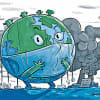
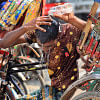

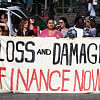
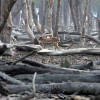


Comments